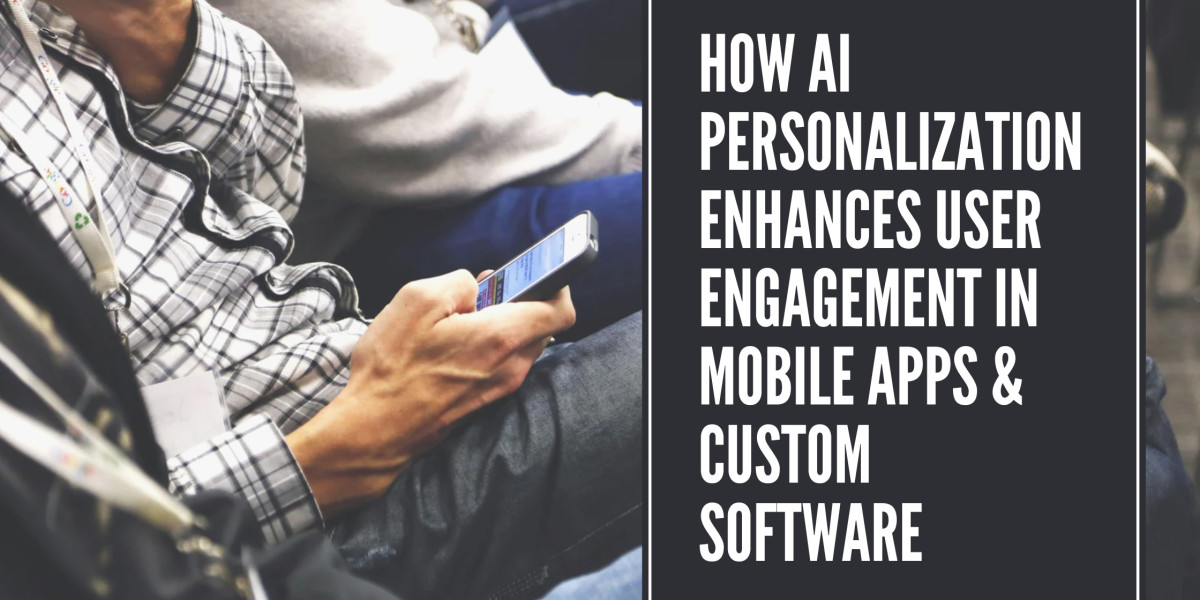The Digital Battlefield: Keeping Users Hooked
Every business in the digital space is fighting for one thing—user attention.
With millions of mobile apps and custom software solutions flooding the market, the real challenge isn’t just about getting users to download an app. The real struggle is keeping them engaged.
Attention spans are shrinking. If an app or software fails to deliver an intuitive, relevant, and seamless experience, users will abandon it within seconds. In fact, research suggests that 77% of users uninstall an app within three days if they don’t find it useful.
So, what’s the solution? AI-driven personalization.
Artificial Intelligence is revolutionizing user engagement by creating hyper-personalized experiences that adapt to each user’s behavior, preferences, and needs. Mobile apps and custom software infused with AI personalization are seeing higher retention rates, better user satisfaction, and increased revenue.
But how exactly does AI achieve this? And why are businesses racing to integrate AI-powered personalization into their digital products? Let’s explore.
The Rise of AI Personalization in Mobile Apps & Custom Software
AI is not just a trend—it’s a necessity. Businesses that fail to personalize user experiences risk losing customers to competitors who do.
Personalization isn’t new. However, traditional methods relied on static data—like generic recommendations based on broad demographics. AI, on the other hand, takes personalization to a whole new level by analyzing real-time user interactions, behavioral patterns, and contextual data.
Here’s why AI-powered personalization is changing the game:
✔ Real-time adjustments – AI adapts experiences instantly based on user actions.
✔ Predictive recommendations – It anticipates what a user will need before they even ask.
✔ Hyper-relevant content – AI curates content, notifications, and suggestions that matter most to the user.
✔ Increased engagement & retention – The more personalized the experience, the longer users stay.
How AI Personalization Works in Mobile Apps & Software
AI-driven personalization doesn’t just happen—it relies on a combination of technologies to create seamless, intuitive experiences.
1. AI-Powered Behavioral Analysis
AI tracks and analyzes how users interact with an app—which features they use most, how often they log in, what actions they take, and where they drop off.
For example, streaming apps like Netflix and Spotify use AI to track viewing and listening habits. The AI then suggests movies, songs, or podcasts based on individual preferences—keeping users engaged for hours.
E-commerce apps also rely on AI-driven behavioral analysis to:
Recommend products based on past purchases.
Offer personalized discounts based on browsing history.
Optimize the user journey to reduce cart abandonment.
This level of intelligent adaptation ensures users see what they actually care about, rather than a one-size-fits-all experience.
2. Dynamic UI & UX Adjustments
AI doesn’t just personalize content—it alters the entire user experience based on individual behavior.
Imagine an app that changes its interface based on how you interact with it.
AI-powered dynamic UI/UX does exactly that:
Adjusting layout, colors, and button placements based on what a user finds most intuitive.
Prioritizing features or menu items based on frequent actions.
Simplifying navigation for new users while offering advanced options to experienced ones.
For instance, ride-hailing apps like Uber use AI to:
Automatically suggest frequent destinations.
Offer quick rebooking options based on past rides.
Adapt pricing and availability based on user demand.
This intelligent customization reduces friction, making the user experience effortless and engaging.
3. AI-Powered Chatbots & Virtual Assistants
Personalization isn’t just about content—it’s also about communication.
AI-driven chatbots are replacing traditional customer service by offering:
✔ Instant, personalized responses tailored to each user’s query.
✔ Predictive assistance—answering questions before they’re even asked.
✔ Conversational AI that sounds human, not robotic.
For instance, fintech apps like Bank of America’s Erica or Apple’s Siri use AI chatbots to:
Offer financial advice based on spending habits.
Predict future expenses and recommend saving plans.
Provide 24/7 automated customer support without human intervention.
With chatbots handling 80% of common queries, businesses reduce costs while improving engagement.
4. Hyper-Personalized Push Notifications
Traditional push notifications are annoying—generic messages that users often ignore. AI fixes this.
By analyzing user preferences, AI ensures notifications are:
Sent at the right time (when a user is most active).
Highly relevant (tailored to the user’s interests).
Actionable (driving meaningful interactions rather than spam).
Take fitness apps like MyFitnessPal—they send AI-driven reminders based on:
✔ Eating habits.
✔ Workout schedules.
✔ Personalized fitness goals.
Instead of a generic “Don’t forget to work out” reminder, the AI sends a motivational message tailored to the user’s routine—increasing engagement exponentially.
AI Personalization in Mobile Apps: Industry Use Cases
AI-driven personalization isn’t limited to a single industry—it’s transforming multiple sectors.
1. E-Commerce & Retail
Personalized product recommendations based on user behavior.
AI-driven customer support bots for instant assistance.
Dynamic pricing strategies based on demand.
2. Healthcare & Wellness
AI-powered symptom checkers offering personalized health insights.
Custom medication reminders based on patient history.
Wearable tech integration for real-time health tracking.
3. Finance & Banking
Personalized spending insights to help users manage budgets.
Fraud detection AI monitoring suspicious transactions.
AI-based investment advisors suggesting tailored financial strategies.
4. Entertainment & Streaming
Smart content recommendations based on watch history.
Dynamic UI adjustments for better content discovery.
AI-driven subtitles & translations based on user language preferences.
With businesses integrating AI personalization into their apps, working with mobile app developers Atlanta has become crucial in creating these intelligent, user-centric solutions.
The Future of AI Personalization in Apps & Software
AI is still evolving, but one thing is clear—personalization will become more sophisticated than ever.
Here’s what’s coming next:
Emotion AI – Apps will detect user emotions through facial recognition and voice tone to offer mood-based recommendations.
AI-powered predictive search – Apps will suggest what a user needs before they even start typing.
Augmented Reality (AR) personalization – AI will integrate with AR to create immersive, customized user experiences.
The goal? To make digital interactions feel as natural and human-like as possible.
Final Thoughts
AI personalization is no longer a luxury—it’s a necessity. Businesses that embrace AI-driven user experiences will see higher engagement, stronger customer loyalty, and increased revenue.
For companies looking to stay ahead, investing in California custom software development ensures they leverage AI-powered personalization to its full potential—creating mobile apps and custom software that truly understand and engage users.
As AI continues to evolve, one thing is certain—personalization is the future, and the future is now.




